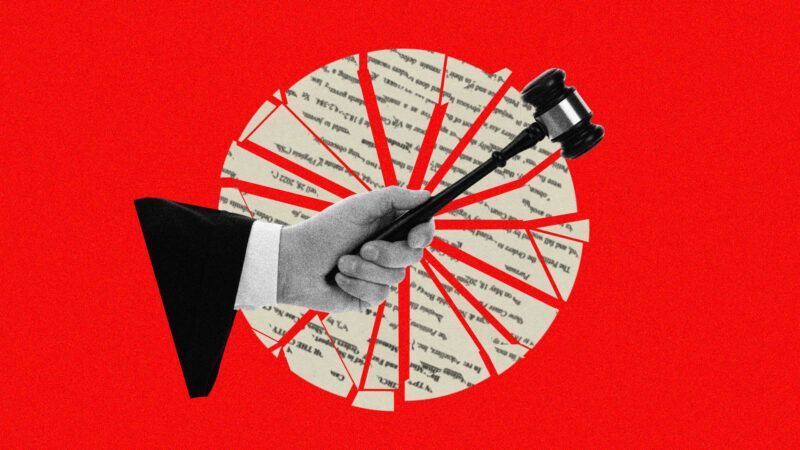Virginia Can't Force Bookstores To Card Kids for Books on Gender and Sexuality
An effort to ban sales of two books to minors ended with a Virginia judge saying that the state’s obscenity statute is “unconstitutional on its face."

On Tuesday, a Virginia Beach court dealt a serious blow to would-be book-banners who were trying to restrict private bookstores from selling two books to minors.
Their lawsuit targeted Gender Queer by Maia Kobabe and A Court of Mist and Fury by Sarah J. Maas. Gender Queer has been at the center of many book-banning battles for its graphic sexual scenes, particularly its visual illustrations of oral sex. The petitioners argued that A Court of Mist and Fury is "sexually offensive in nature" for its illustrations of sexual acts and descriptions of "abusive and intrusive sexual contact." Circuit Judge Pamela S. Baskervill, who came out of retirement to try the case since all other judges recused themselves, dismissed the suit on free speech and due process grounds.
In May, former congressional candidate Tommy Altman and state Del. Tim Anderson (R–Virginia Beach), his legal counsel, filed two petitions under Virginia's obscenity law to have the books deemed obscene for minors. They attempted to require booksellers to obtain parental consent before selling those books to minors.
Virginia residents may file an obscenity petition when they believe someone "is engaged in the sale or commercial distribution of any obscene book." An obscenity petition may result in the court issuing "a temporary restraining order against the sale or distribution" of the book in question, which then assumes knowledge of the restriction among those who distribute the title even before a full trial has taken place.
In Virginia, obscenity involves "a shameful or morbid interest in nudity, sexual conduct, sexual excitement, excretory functions or products thereof or sadomasochistic abuse" as its "dominant theme or purpose."
"Taken as a whole," a book must also lack "serious literary, artistic, political or scientific value" to be considered obscene.
Altman and Anderson specifically sought to keep minors from purchasing Gender Queer and A Court of Mist and Fury from Barnes & Noble and independent sellers. Barnes & Noble filed a brief supporting motion to dismiss the petitions, noting that they fell "woefully short of the constitutional standards governing obscenity."
For one, even though the petitions allege the books have "no serious literary, artistic, political, or scientific value to minors," this is a conflation of "two statutes that employ different legal standards." Though Virginians may file petitions under the obscenity clause, nothing in that clause specifically names or applies to minors. Thus, Barnes & Noble argued that the books could not be considered "obscene only…to juveniles."
Nor did the petitioners make an effective case that the books meet the general standards for obscenity. Barnes & Noble's brief points out that the petitions single out only small portions of the books as inappropriate for minors, defying the established standard to consider material "as a whole" in order to deem it obscene.
The petitions "ignore the language of the Virginia statutes under which they were filed and assume that developments in First Amendment law over the past sixty-five years never occurred," notes Barnes & Noble's brief.
Baskervill didn't actually determine whether the books were obscene for minors, but she did find that the petitioners didn't "allege facts sufficient to support" a general obscenity finding. Moreover, Baskervill found that the Virginia Code's obscenity statute "is unconstitutional on its face." It "authorizes a prior restraint that violates the First Amendment and the Constitution of Virginia," she wrote, and "violates due process by authorizing judgment without notice to affected parties."
In some ways, this case was an unprecedented extension of the modern culture war's book front. Since 1973, the Supreme Court "has accepted no cases involving literary obscenity, nor has it found any book to be obscene," notes Barnes & Noble's brief. The Virginia Beach petitions also represent an unusual strategy by attempting to harness a little-used section of state law to block the distribution of certain books to minors. They were attempts "to manufacture jurisdiction" by "mashing together" unrelated statutes, according to the Barnes & Noble brief.
But this case was especially notable—and concerning—since the petitioners attempted to target private book distributors under a criminal statute. Rather than just affecting public schools, where many book battles take place, these petitions aimed to limit activities in the private sphere. Regardless of what one thinks about the literary value of these two books or the age level for which they're appropriate, these circumstances alone are deeply troubling.

Show Comments (33)